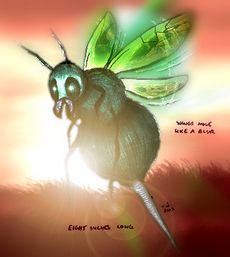The official GemStone IV encyclopedia.
|
|
| Attack Attributes
|
| Physical Attacks
|
| Stinger (attack)
|
172 AS
|
| Special Offensive Abilities
|
| Sting
|
Fatigue (lower AS/DS)
|
|
|
|
|
|
If it wasn't for the huge size of this hornet, you might even call it kinda cute. The fuzzy body measures about 8 inches long and almost that big around. The wings are moving so fast that it seems as though the hornet is surrounded with a faint green haze. Darting here and there, with an agility astonishing in something this pudgy looking, it's enough to make one think twice before getting too close!
Hunting strategies
This section has not been added yet; please add to it now!
Other information
The greenwing hornet has a sting maneuver that will cause fatigue which results in a loss of both attack and defensive strength.
With blinding speed, a greenwing hornet buzzes around behind you and stings you in a vulnerable spot!
You begin to feel a strange fatigue, spreading throughout your body.
Your body begins to respond normally again.
The nettle berries outside the bower will unpoison you, which is a joke because nettle berries are poisonous.
Behind the Scenes
Mythologically, bees are supposed to be able to travel back and forth from the underworld, like the moaning spirits can implicitly. More narrowly, their presence in Castle Anwyn may be related to the Lady of the Lake, the sorcerous queen of Avalon (Annwn) whom Arthur received Excalibur. One of her rumored true dwelling places is Loch Arthur in Scotland, which is next to the village of Beeswing. This was named after a famous 19th century mare from thoroughbred racing. The Lady of the Lake was the one who bewitched and imprisoned Merlin, whose enchanted tomb in pseudo-etymology is the root of Glastonbury Abbey. This would refer to the sorcerous queen mother of Terate, who otherwise appears to be based on Morgan le Fay (mother of Owain), possible crossed to some extent with Morgause (witch-queen mother of Gawain and Mordred.)
Castle Anwyn has subtle relations with Shadow Valley, most explicitly seen in the presence of the moaning spirits. Among these is the pookas, trickster shapeshifters in Celtic folklore, who usually take the form of horses in heavy chains. (Thus, they might simply refer to faeries as insect-like or warring with insects, such as the nineteenth century poetic allegory "The Fresh Water Siren" about the great water beetle which could obliquely relate to the Lovecraftian "Shadow out of Time" premise of the insect race following the end of mankind, or even the plates of Arthur Rackham which were featured in many of the related source stories.) The word "mare" descends from goblin-like creature in Germanic folklore that ride the chest of their victims giving them nightmares, and when they are shape-shifting they often take the form of wasps. The word "mare" actually comes from the Old English word for "incubus", which are nightmare demons who sire cambions like Merlin, which is especially relevant because of Terate's half-demonic state in the Vvrael quest. The Greek demon of nightmares is the giant Ephialtes, whose name means "leaper."
Another more obscure motivation for the bees may be Mount Aenatumgana, where "gana" likely refers to the attendants of Shiva. The analogous event of a demonic force going to the mountain to kill the gods is Arunasura, who could not be killed by any two or four legged creature. So the demon was ultimately destroyed by a vast swarm of hornets, wasps, bees, and so on. This is relevant because Shiva is a later form of Indra, the slayer of the Vedic serpent demon Vritra, who appears to be the partial basis of the Shadow Valley story and may be the base of the word Vvrael. There was also a Cherokee myth of a large bird resembling a greenwing hornet that kidnapped children much like the faeries of Celtic folklore.
References
| Near-level creatures - edit
|
|
|
